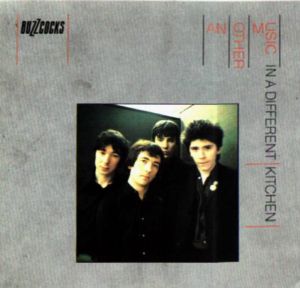
- Format: MP3

Another Music in a Different Kitchen expands on the stark three-minute pop song and themes of confusion, alienation and betrayal, adding a new emphasis on harmony and humor and a growing coordination of the players in contrast to the earlier inspired chaos. "Fast Cars," the jagged waltz "Sixteen" and the tom-tom pounder "(Moving Away From the) Pulsebeat" are all mini mindblowers.
General judgment holds the Buzzcocks' peerless singles, the definition of punk-pop at its finest, as the best expression of their work. However, while the singles showcased one particular side of the band, albums like the group's long-playing debut, Another Music in a Different Kitchen, showcased the foursome's other influences, sometimes brilliantly. The big secret is Pete Shelley's worship of Krautrock's obsessive focus on repetition and rhythm, which transforms what would be "simply" basic punk songs into at-times monstrous epics. The ghost of Can, in particular, hovers even on some of the shorter songs — unsurprising, given Shelley's worship of that band's guitarist, Michael Karoli. "Moving Away From the Pulsebeat" is the best instance of this, with a rumbling John Maher rhythm supporting some trance-like guitar lines. As for the sheer rush of pop craziness, Another Music in a Different Kitchen is simply crammed with stellar examples. The leadoff track, "Fast Cars," starts with the opening of Spiral Scratch's "Boredom"'s intentionally hilarious two-note solo intact, before ripping into a slightly bemusing critique of the objects in question. Most of the similar tracks on the album may be more distinct for their speed, but Shelley, in particular, always seems to sneak in at least one astonishing line per song, sometimes on his own and sometimes thanks to Howard Devoto via older co-written tunes redone for the record. One favorite standout: "All this slurping and sucking/It's putting me off my food!" on "You Tear Me Up." Top all this off with any number of perfect moments — the guitar work during the breaks on "Love Battery," the energizing yet nervous coda of "Fiction Romance," the soaring angst throughout "I Don't Mind" — and Another Music flat-out succeeds.